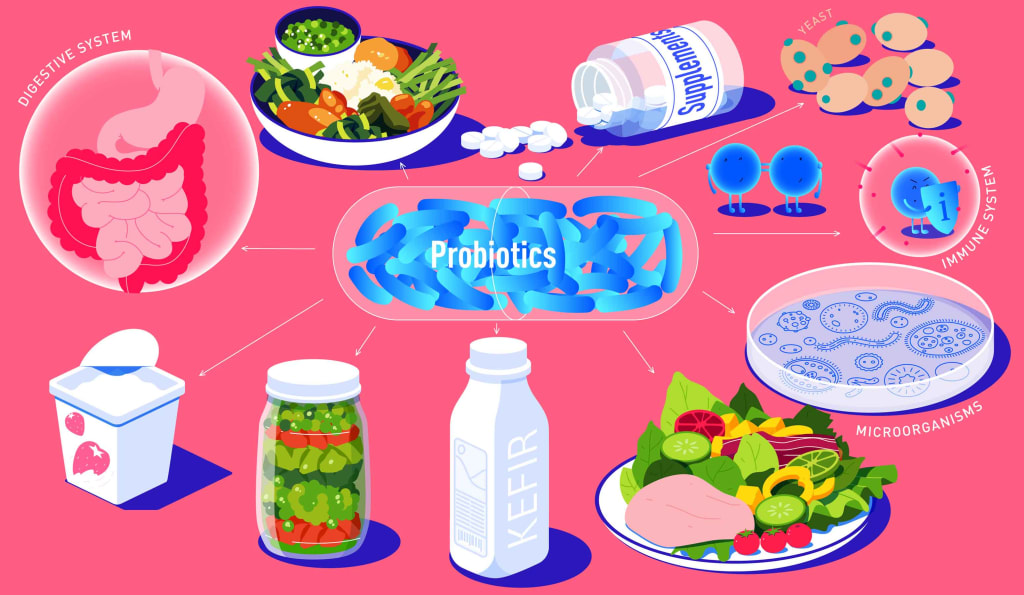Probiotics for Constipation: What You Need to Know
best probiotic for constipation

Constipation is a common gastrointestinal problem that affects millions of people worldwide. While there are numerous over-the-counter remedies and prescription medications available for constipation, many people are turning to natural remedies, such as probiotics, to treat this condition.
Probiotics are live, beneficial bacteria that are naturally found in fermented foods, including kefir, sauerkraut, kombucha, and tempeh. They are also sold as supplements and are believed to enhance the gut microbiome - the collection of beneficial bacteria in your digestive tract that helps regulate inflammation, immune function, digestion, and heart health.
In this article, we will explore whether probiotics can help treat constipation, their effects on various types of constipation, their potential downsides, and how to select and use probiotics effectively.
Types of Constipation
Constipation is a condition characterized by infrequent bowel movements, difficulty passing stool, and hard, dry stools. There are several types of constipation, including:
Chronic Idiopathic Constipation (CIC)
CIC is a type of constipation that occurs without a clear underlying cause. It is often accompanied by bloating, abdominal pain, and discomfort, and may be linked to slow colonic transit.
Irritable Bowel Syndrome with Constipation (IBS-C)
IBS-C is a type of constipation that occurs in people with irritable bowel syndrome (IBS), a common digestive disorder characterized by abdominal pain, bloating, and changes in bowel habits. IBS-C is often accompanied by hard, lumpy stools and a feeling of incomplete bowel evacuation.
Childhood Constipation
Constipation in children is a common problem that can be caused by several factors, including diet, family history, food allergies, and psychological issues.
Pregnancy-Related Constipation
Constipation is a common problem during pregnancy, affecting up to 38% of pregnant women. It can be caused by hormonal fluctuations, prenatal supplements, or changes in physical activity.
Medication-Induced Constipation
Several medications, including opioids, iron pills, antidepressants, and certain cancer treatments, can cause constipation as a side effect.
Effects of Probiotics on Constipation
Probiotics have been studied extensively for their effects on constipation. Here's what the research says:
Irritable Bowel Syndrome
Probiotics are often used to treat IBS symptoms, including constipation. A review of 24 studies showed that probiotics reduced the severity of symptoms and improved bowel habits, bloating, and quality of life in people with IBS. Another study in 150 people with IBS revealed that supplementing with probiotics for 60 days helped improve bowel regularity and stool consistency. In a 6-week study in 274 people, drinking a probiotic-rich, fermented milk beverage increased stool frequency and reduced IBS symptoms.
Childhood Constipation
Multiple studies indicate that probiotics relieve constipation in children. For instance, a review of 6 studies found that taking probiotics for 3-12 weeks increased stool frequency in children with constipation, while a 4-week study in 48 children linked this supplement to improved frequency and consistency of bowel movements.
Pregnancy-Related Constipation
Some research suggests that taking probiotics during pregnancy may prevent constipation. In a 4-week study in 60 pregnant women with constipation, eating probiotic yogurt enriched with Bifidobacterium and Lactobacillus bacteria daily increased the frequency of bowel movements and improved several constipation symptoms. In another study in 20 women, taking probiotics containing a mix of bacteria strains increased bowel movement frequency and improved constipation symptoms like straining,bloating, and abdominal discomfort. However, it is important to note that more research is needed to confirm these findings and to determine the most effective strains and dosages of probiotics for treating pregnancy-related constipation.
Another natural remedy for pregnancy-related constipation is increasing fiber intake. Pregnant women should aim to consume at least 25 to 30 grams of fiber per day. High fiber foods include fruits, vegetables, whole grains, and legumes. It is important to increase fiber intake gradually to prevent bloating and discomfort. Drinking plenty of water and staying hydrated can also help to prevent constipation.
Exercise is another effective way to prevent constipation during pregnancy. Regular physical activity, such as walking or prenatal yoga, can help to stimulate bowel movements and improve overall digestive health. Pregnant women should aim for at least 30 minutes of moderate exercise each day, unless advised otherwise by their healthcare provider.
In some cases, over-the-counter laxatives may be necessary to relieve pregnancy-related constipation. However, it is important to consult with a healthcare provider before taking any medication during pregnancy, as some laxatives can be harmful to the developing fetus. Safe options for pregnant women include stool softeners and osmotic laxatives, which work by drawing water into the colon to soften stool and promote bowel movements.
In summary, pregnancy-related constipation is a common and often uncomfortable condition that can be prevented and treated with natural remedies and, in some cases, medication. Pregnant women should aim to maintain a healthy diet rich in fiber, stay hydrated, engage in regular physical activity, and consult with a healthcare provider before taking any medication for constipation. By taking these steps, women can promote healthy digestion and bowel movements throughout their pregnancy.
Additional Tips for Relieving Constipation
While probiotics may be helpful for relieving constipation, there are other lifestyle changes you can make to improve bowel movements. Here are a few tips:
Increase fiber intake: Eating a diet high in fiber can help bulk up stool and make it easier to pass. Good sources of fiber include fruits, vegetables, whole grains, and legumes.
Stay hydrated: Drinking plenty of water can help keep stools soft and easy to pass.
Exercise regularly: Exercise helps stimulate the digestive tract and can promote more regular bowel movements.
Don't ignore the urge to go: When you feel the urge to have a bowel movement, it's important to go. Ignoring the urge can lead to harder stools and constipation.
Avoid certain foods: Certain foods can contribute to constipation, such as processed foods, dairy products, and foods high in fat.
Practice relaxation techniques: Stress can contribute to constipation, so practicing relaxation techniques such as deep breathing, yoga, or meditation may be helpful.
Try over-the-counter remedies: There are a variety of over-the-counter remedies for constipation, such as laxatives or stool softeners. However, it's important to talk to a healthcare professional before using them, as some may have side effects or interact with other medications.
Conclusion
Probiotics are a natural and potentially effective way to treat constipation. While they may not work for everyone, there is a significant body of research suggesting that they can be helpful for those with certain types of constipation, such as IBS or constipation caused by pregnancy or medication.
When choosing a probiotic supplement, it's important to look for one that contains the specific strains of bacteria that have been shown to be effective for constipation. Additionally, it's important to talk to a healthcare professional before beginning to take probiotics, particularly if you have any underlying health conditions or are taking medications.
Finally, it's important to remember that probiotics are just one potential tool for relieving constipation. There are a variety of lifestyle changes that can be helpful as well, such as increasing fiber intake, staying hydrated, and exercising regularly. By taking a holistic approach to constipation treatment, you can improve your chances of finding relief and improving your overall digestive health.
About the Creator
abdullah al masum
I am deticated content marketer. check out my blog.






Comments
There are no comments for this story
Be the first to respond and start the conversation.